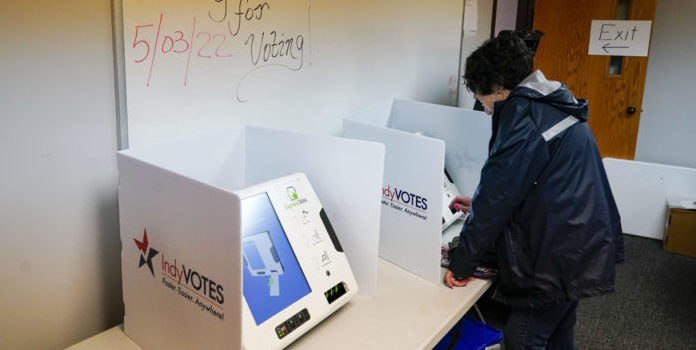(Headline USA) Fed-up conservatives wanting to push the Republican-controlled Indiana Legislature further to the right are trying to unseat several GOP lawmakers in Tuesday’s primary.
Roughly two dozen pro-liberty candidates are in Republican legislative races across the state, with their targets including several top-ranking members of the GOP-dominated House.
Those challengers argue the Legislature hasn’t been aggressive enough in attempting to ban abortion, enhancing gun rights and overturning COVID-19 restrictions that were ordered by Republican Gov. Eric Holcomb.
Republican legislative leaders argue the “no compromise” stances adopted by many challengers aren’t practical and tout the state’s low taxes and unemployment and broad private school voucher program among its conservative successes.
Unlike in other GOP races across the country — including Ohio, which also has a statewide primary Tuesday — the Indiana legislative contests have focused on state issues, rather than which candidate is closest to former President Donald Trump or has his support.
The challengers say they are tapping into a deep resentment among voters — and even winning a few seats could nudge the Legislature further to the right.
It was unclear how the leak of a draft opinion suggesting the U.S. Supreme Court will overturn a 1973 ruling that legalized abortion nationwide would impact the primary. Indiana lawmakers didn’t pursue major anti-abortion action during this year’s session as they waited for a decision from the Supreme Court. If the court overturns Roe v Wade, those lawmakers could ask Holcomb to call the Legislature into a special session so they can act without having to wait until 2023.
“The vast majority of House Republicans, including myself, have been abundantly clear that we want to take action to further protect life should the U.S. Supreme Court overturn, in full or in part, Roe,” Republican House Speaker Todd Huston said in a statement Tuesday. “We will continue to await the court’s final decision.”
Indiana law generally prohibits abortions after 20 weeks of pregnancy, with 99% of abortions in the state occurring at 13 weeks or earlier, according to a state Health Department report.
The House GOP campaign operation has given over $1 million to candidates for the primary — including those trying to unseat Republican Reps. Curt Nisly of Milford and John Jacob of Indianapolis, both heroes of the “liberty candidate” challengers for proposals blocked by legislative leaders, including a total abortion ban and seeking to void all state COVID-19 restrictions as far back as late 2020.
Meanwhile, the Liberty Defense PAC, which has worked to rally support for its endorsed candidates, had raised a total of about $95,000 by the end of March.
“Some of our incumbents are facing very, very engaged opponents,” Huston said. “You can’t take any chances. Our team has been doing everything they need to do, knocking on doors, lots of voter contacts, those types of things. Nobody should take it lightly.”
Some challengers say their movement grew from protests against COVID-19 shutdowns and complaints that GOP legislators didn’t take action to end Holcomb’s executive orders, including a mask mandate.
Brittany Carroll, a family law attorney from Greenwood running against Rep. Peggy Mayfield of Martinsville, said too many government officials, from Holcomb to local school board members, had ignored concerns from the public and favored monied interests. She and other challengers said they weren’t deterred by heavy spending to defeat them.
“Trying to buy these seats for certain people, that’s not government of the people, that’s government of the Statehouse,” Carroll said.
Still, Republican voters on Tuesday largely indicated support for the incumbents, who they said would ensure Hoosiers’ personal freedoms and push to restrict access to abortions in Indiana.
“I’m a conservative Christian, and I can see that in our culture today, there is so much moving in directions that are not Biblical, and I’m thinking that might be part of the pushback” against the incumbents, said Mike Teipen, 73, of Indianapolis. “It maybe rubs people too much the wrong way — they don’t want to take a strong stand on certain issues. But that’s what I think makes a good lawmaker.”
Adapted from reporting by the Associated Press

